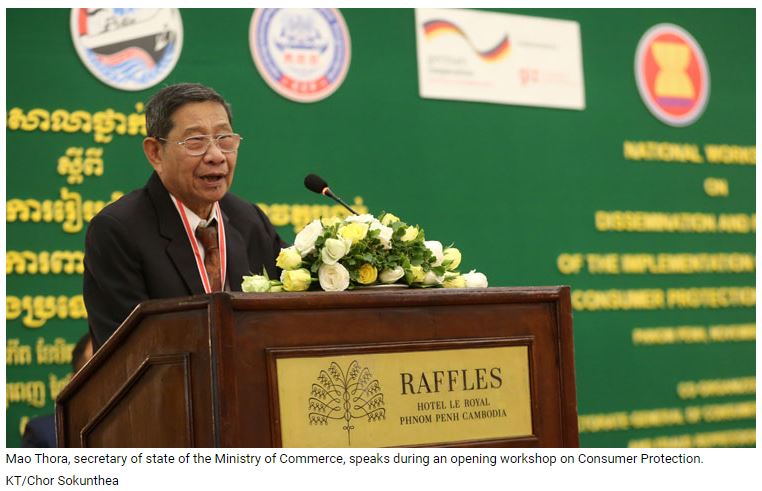Cambodia: MoC conducts workshop on Law on Consumer Protection
The Ministry of Commerce’s Directorate General of Consumer Protection, Competition and Fraud (CCF) has conducted a “National Dissemination and Planning Workshop on the Law on Consumer Protection” for relevant stakeholders and representatives of local and international organisations. It was held at Raffles in Phnom Penh yesterday.
The event served to promote the implementation of the consumer protection law and to prioritise actions based on consumer concerns in Cambodia. The law was officially enacted for the public on Nov 2, 2019. However it has yet to be fully implemented because of the need for more regulations and directives.
Mao Thora, Secretary of State at the Ministry of Commerce, said that the government will design regulations and strategic plans to ensure that the implementation of the consumer protection law will be efficient and high effectively for the public.
“As a young consumer protection regime, we are faced with many demands and tasks. I am happy to announce that the National Commission on Consumer Protection (NCCP), chaired by the Minister of Commerce, was constituted recently to provide strategic orientation and undertake concrete actions that [will] contribute to the wellbeing and protection of Cambodian consumers.” Thora added.
The law ensures the protection of consumers, and contributes to the promotion of fair competition. It also sets up the rules and mechanisms needed to contribute to the creation of a business environment, in which the rights and interests of consumers are protected and business competition is conducted fairly, so that consumers and traders can engage with each other with confidence.
The law is applied to any person who conducts business, whether for a profit or nonprofit organisation, including the sale of goods or services or real rights over immovable property to the Kingdom’s consumers unless otherwise provided by other regulation.
Thora added that the law on consumer protection will play a crucial role in contributing to the modernisation of society and will help Cambodia to strengthen its cooperation with the other countries in Asean and the rest of the world.
He added that the main role of the law is not to put a burden on businesspeople but to codify their responsibilities to consumers. It will ultimately provide advantages to businesspeople because when a business is trusted, it gains support from consumers.
“[In implementing this] law efficiently, [there are] many components. [Promoting] awareness of the rights of consumers through the creation of the consumer association in each sector will protect [both] consumer rights and [provide] other benefits,” Thora added.
“We will also raise the awareness of the law among the public because it is important to promote these rights and the benefits [of them] to consumers,” he added. We will set the roadmap and strategic plans [needed] to ensure that the implementation of the law is efficient,” he added.
With the NCCP, Cambodia possesses an inter-ministerial mechanism that facilitates coordination and coherence at the policy level, said Thora. The NCCP is expected to delegate day-to-day operations to the CCF as its secretariat. The prerequisites and procedures, for example, on complaints-handling and inspections, are currently being put into place, according to Thora.
“Strategic planning and prioritisation are essential in order to better focus efforts and resources,” he added.
Frank Jattke, Team Leader for Asean Projects GIZ Cambodia, said that the regional project “Consumer Protection in Asean” (PROTECT) aims to strengthen consumer protection systems in selected Asean member states through support at both the regional and national levels. This includes providing technical assistance to enhance regional cooperation, institutional and legal framework development and dispute resolution mechanisms.
“On behalf of the Federal Ministry for Economic Cooperation and Development (BMZ) of Germany, PROTECT works directly with CCF, under the Ministry of Commerce. Activities under this project are guided by the Asean Strategic Action Plan on Consumer Protection (ASAPCP) 2016-2025,” Jattke said.
“We attended the workshop to learn about the consumer protection landscape in Cambodia and in Asean,” he added.
He noted that fostering a pro-consumer culture through the engagement of public and private stakeholders is part of their approach, stating: “Given the law was newly enacted in late 2019. Without a doubt, there is much to be done to ensure basic consumer rights [safety, choice, representation and redress, among others] as well as encouraging responsible business.”
Source: https://www.khmertimeskh.com/50786648/moc-conducts-workshop-on-law-on-consumer-protection/


 English
English




